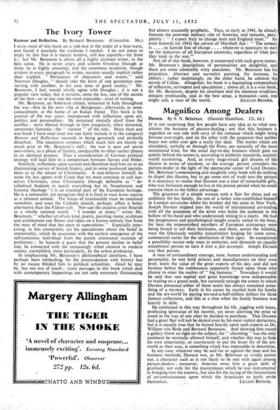The Ivory Tower
Rumour and Reflection. By Bernard Berenson. (Constable. 30s.) I READ most of this book on a sick-bed in the midst of a heat-wave, and found it precisely the medicine 1 needed. I do not mean to imply by this that it is merely lenitive, still less soporific—far from it ; but Mr. Berenson is above all a highly civilised writer, in the best sense. He is never angry and seldom frivolous (though at times he is highly amusing), and his enormous erudition, though evident in every paragraph he writes, remains usually implicit rather than explicit. " Portraiture of characters and events," said Norman Douglas, " should take the form of one gentleman con- versing with another, in the easy tone of good society." Mr. Berenson, I feel, would wholly agree with Douglas ; it is not a popular view today; but it remains, none the less, one of the secrets of the best—or at any rate the most enjoyable—kind of writing.
Mr. Berenson, an American citizen, remained in Italy throughout the war—first in his own villa at Settignano ; afterwards, in semi- concealment, at the home of an Italian friend. This book is his journal of the war years, interspersed with reflections upon art, politics and personalities. He remained stoically aloof from the conflict ; news filtered through to him irregularly, often distorted, sometimes fantastic—the " rumour " of the title. More than any war-book I have read (and one can fairly include it in the category) Rumour and Reflection succeeds in being genuinely and perfectly detached. The successive rumours which reach him are merely so much grist to Mr. Berenson's mill ; the war is seen sub specie aoternitatis, as a phase of history, comparable to other earlier phases. in an identical process. Thus a consideration of German political strategy will lead him to a comparison between Xerxes and Hitler.
Similarly, reflections upon current anti-Semitism lead him on to an illuminating survey of Jewish history, and to some profound specula- tions as to the nature of Christianity. A non-believer himself, he none the less agrees with Croce that we muss continue to call our- selves Christians, since Christianity (though definable as " de- tribalised Judaism in nearly everything but its Neoplatonic and Gnostic theology ") is an essential part of the European heritage. He is a rationalist, yet recognises that it is fatal to treat homo sapiens as a rational animal. The forces of irrationality- must be canalised somehow, and even the Catholic church, perhaps, offers a better alternative than the Fiihrer-cult. Nor can the creative artist flourish in a wholly rational world. " I wonder at times," writes Mr. Berenson, " whether art of any kind, poetry, painting, music, sculpture and architecture can flower and ripen on a humus entirely free from the state of mind that lies open to superstition." Especially inter- esting, in this connection, are his speculations about the "belief in immortality, which he associates with the earliest emergence of the self-conscious individual from the purely communal societies of prehistory ; he hazards a guess that the present decline in belief may be connected with the increasingly tribal element in modern society, exemplified, more particularly, by the urban proletariat.
In emphasising Mr. Berenson's philosophical aloofness, I have perhaps been misleading, for his preoccupation with history has by no means blinded him to political actualities. Aloof he may be, but not out of touch ; many passages in this book which deal with contemporary happenings are not only extremely illuminating but almost uncannily prophetic. Thus, as early as 1941, he already foresees the post-war military role of Amerida, and remarks, perci- piently " 1 expect Italy to change least and England most." He even foretells, (in 1943) the advent of Marshall Aid : "Tie remedy is . . . . to furnish free of charge . . . . whatever is necessary to start up the industries of all European countries, regardless of what part they took in the war."
Not all of this book, however, is concerned with such grave matter. Mr. Berenson's descriptions of personalities are delightful, and there are some admirably witty anecdotes. Mr. Berenson has his prejudices. Abstract and surrealist painting, for instance, he abhors ; rather surprisingly, on the other hand, he admires--the novels of Caine. Altogether, his book is a fascinating compendium of reflection, retrospect and speculation ; above all, it is a wise book, for Mr. Berenson, despite his aloofness -and his immense erudition, remains profoundly, and in the best sense, a lumanist—and, one







































 Previous page
Previous page